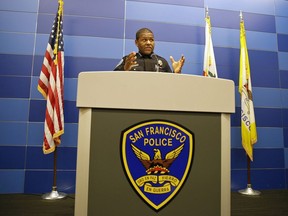
SAN FRANCISCO (AP) — Police in San Francisco could get the ability to deploy potentially lethal, remote-controlled robots in emergency situations if supervisors of the politically Democratic city grant permission Tuesday in a highly watched board vote.
Police oversight groups are urging the 11-member San Francisco Board of Supervisors to reject the idea, saying it would lead to further militarization of a police force already too aggressive with poor and minority communities. They said the parameters under which use would be allowed are too vague.
Sign up to receive the daily top stories from the National Post, a division of Postmedia Network Inc.
Thanks for signing up!
A welcome email is on its way. If you don't see it, please check your junk folder.
The next issue of NP Posted will soon be in your inbox.
The San Francisco Police Department said it does not have pre-armed robots and has no plans to arm robots with guns. But the department could deploy robots equipped with explosive charges “to contact, incapacitate, or disorient violent, armed, or dangerous suspect” when lives are at stake, SFPD spokesperson Allison Maxie said in a prepared statement.
“Robots equipped in this manner would only be used in extreme circumstances to save or prevent further loss of innocent lives,” she said.
The proposed policy does not lay out specifics for how the weapons can and cannot be equipped, leaving open the option to arm them. “Robots will only be used as a deadly force option when risk of loss of life to members of the public or officers is imminent and outweighs any other force option available to SFPD,” it says.
The vote comes under a new California state law that requires police and sheriffs departments to inventory military grade equipment and seek approval for their use. San Francisco police currently have a dozen functioning ground robots used to assess bombs or provide eyes in low visibility situations, the department says. They were acquired between 2010 and 2017.
The state law was authored last year by San Francisco City Attorney David Chiu while he was an assemblymember. It is aimed at giving the public a forum and voice in the acquisition and use of military grade weapons that have a negative effect on communities, according to the legislation.
San Francisco police did not immediately respond to a question about how the robots were acquired, but a federal program has dispensed grenade launchers, camouflage uniforms, bayonets, armored vehicles and other surplus military equipment to help local law enforcement.
In 2017, then-President Donald Trump signed an order reviving the Pentagon program after his predecessor, Barack Obama, curtailed it in 2015, triggered in part by outrage over the use of military gear during protests in Ferguson, Missouri, after the shooting death of Michael Brown.
Like many places around the U.S., San Francisco is trying to balance public safety with treasured civilian rights such as privacy and the ability to live free of excessive police oversight. In September, supervisors agreed to a trial run allowing police to access in real time private surveillance camera feeds in certain circumstances.
Dissenting supervisors said they were astonished that a city that cherished its activism, diversity and privacy would even consider giving such powers to law enforcement.
The San Francisco Public Defender’s office sent a letter Monday to the board saying that granting police “the ability to kill community members remotely” cuts against San Francisco’s progressive values. The public defender’s office would like the board to reinstate language prohibiting the police from using robots in a show of force against any person.
The Oakland Police Department across the San Francisco Bay dropped a similar proposal after public backlash.


